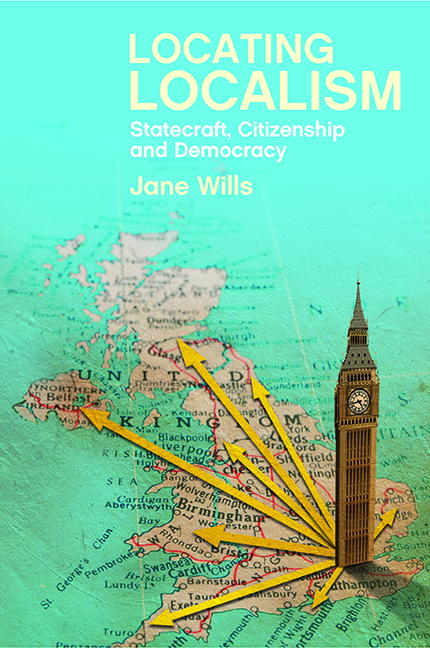Book contents
- Frontmatter
- Dedication
- Contents
- List of figures and tables
- Acknowledgements
- Introduction: the argument being made in this book
- one Making sense of localism
- two The geo-constitution and the long history of localism
- three The place of the people
- four Localist local government
- five Institution building for localist futures
- six Community organising: past, present and future
- seven A localist future?
- Appendix: Research design and methods
- References
- Index
four - Localist local government
Published online by Cambridge University Press: 05 April 2022
- Frontmatter
- Dedication
- Contents
- List of figures and tables
- Acknowledgements
- Introduction: the argument being made in this book
- one Making sense of localism
- two The geo-constitution and the long history of localism
- three The place of the people
- four Localist local government
- five Institution building for localist futures
- six Community organising: past, present and future
- seven A localist future?
- Appendix: Research design and methods
- References
- Index
Summary
Thus far, this book has highlighted the potential to revisit the history and geography of English government and to explore the creation of neighbourhood-level infrastructure that is able to facilitate the organisation of local communities and foster their engagement in local initiatives. Such innovation will necessarily involve working with existing state forms, and, in this regard, local authorities remain critical in shaping the local political culture and have the greatest potential to create new opportunities for getting people involved (Lowndes et al, 2006). However, whereas previous initiatives have tended to secure the state's control of this process, there is now an opportunity to go beyond full control by the state.
This chapter focuses on the experiences of the London Borough of Lambeth in its quest to become a cooperative council. It outlines the way in which the council has tried to develop a new culture based on a more reciprocal relationship with local people. In its more recent manifestations, this initiative has had a ‘localist turn’ as the council has grappled with ways to better engage people through their local community groups at the neighbourhood scale. Whereas much of the national debate about localism has been about devolving political power and authority from Westminster and Whitehall to other state-funded organisations, in Lambeth, localism has been about devolution from the town hall to local people and their community groups. As such, Lambeth's experience has resonance across the public sector as organisations like housing associations, the NHS and the police try to better engage local citizens in the work that they do.
Lambeth is a large and diverse London borough comprising some 300,000 people among whom some 142 languages are spoken (London Borough of Lambeth, 2011, 10). Stretching from the river Thames in the north, it includes Brixton in the middle and greener areas such as Thornton Heath in the south (Figure 4.1). Lambeth's boundaries were established in 1964, incorporating the old boroughs of Lambeth, Clapham and Streatham, and it now comprises 21 wards, each with three elected representatives who sit on the council. In the 2014 elections the Labour Party increased its hold of the council, taking 59 of the 63 seats, a historic high, albeit that only a third of the 220,000 residents who were registered to vote turned out on the day (GLA, 2014).
- Type
- Chapter
- Information
- Locating LocalismStatecraft, Citizenship and Democracy, pp. 113 - 142Publisher: Bristol University PressPrint publication year: 2016

